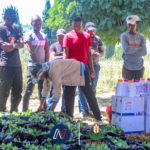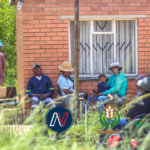For ‘Matšepang Molema, a vegetable producer and a member of the Bokamoso Mabuthile Nutrition Club, a week-long training on food preservation has been a game changer.
What was once just a household activity for survival is now a promising business opportunity in her eyes.
“The training opened my eyes. I realised I had been sitting on a business opportunity all along,” Molema shared.
Molema was a participant of a week-long training organised and facilitated by the Ministry of Agriculture, Food Security, and Nutrition, through its Nutrition Department and in partnership with the Smallholder Agriculture Development Project (SADP II),
Like many small-scale farmers, Molema has been growing vegetables purely for consumption. Until now, she had never considered preserving food for future use or as a commercial venture.
“The training taught us how to preserve different types of food for times when they are out of season. It is important because even after months, preserved food still provides essential nutrients,” she explained.
While climate change is presenting growing challenges for farmers, food preservation provides a lifeline for nutrition and food security.
Mamonehela Ntsukunyane, another member of the nutrition club, highlighted erratic weather patterns and extreme heat as major threats to production of crops, citing lack of water as the biggest problems.
“We don’t have reliable access to water, which makes it difficult to produce food in large quantities. Even when we manage to grow crops, we struggle to get seeds and pesticides,” Ntsukunyane said.
She indicted that limited resources are preventing small-scale farmers from reaching their full potential, making food preservation skills even more critical in ensuring food availability throughout the year.
To address these challenges, the Ministry of Agriculture, Food Security, and Nutrition, through its Nutrition Department and in partnership with the Smallholder Agriculture Development Project (SADP II), has launched food preservation campaigns across the country.
According to Keketso Seleteng, Leribe District Nutrition Officer, these campaigns aim to accelerate food preservation practices and educate communities on the importance of food security and sustainability.
“We have completed training in six districts, including Leribe. Nutrition clubs have been trained in various cooking and food preservation techniques, proper hygiene practices, and the latest preservation technologies,” Seleteng explained.
Seleteng further explained that the training covered cooking and food preservation methods for different food types, the use of natural and artificial preservatives to extend shelf life, proper hygiene during food preparation and storage, new preservation technologies that improve food quality, the importance of measurements and labeling in food preservation, and teamwork and food safety protocols.
“With more farmers recognising the benefits of food preservation, there is a growing opportunity to turn these skills into profitable agribusiness ventures, he said noting preserved foods, such as dried fruits and vegetables, could open new markets for local farmers, allowing farmers to sell their produce beyond harvest seasons and reduce post-harvest losses.
For Molema and other nutrition club members, the training is just the beginning.
“With continued support, resources, and access to markets, food preservation could not only enhance food security but also create economic opportunities for smallholder farmers across Lesotho,” Ntsukunyane said.








